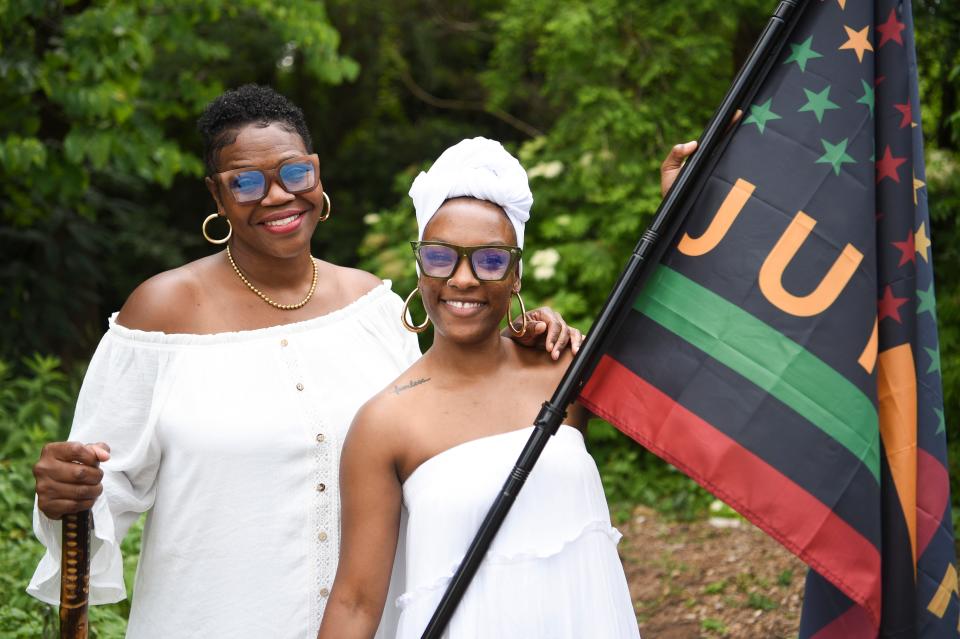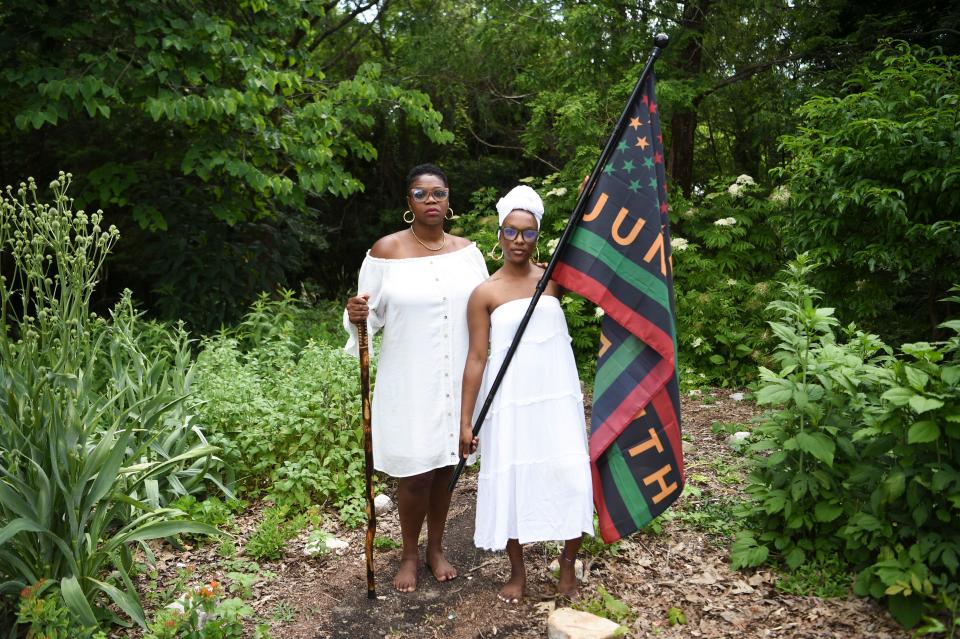Rooted East: How Black growers are empowering Knoxville and reimagining Juneteenth
When a young Black entrepreneurial chef and a community elder got together to dream up ways to make change at the center of food apartheid and social justice, they found themselves at the heart of something even bigger: an avenue to give Black Knoxvillians the tools for their own wellness.
Tiara-Lady Wilson and Femeika Elliott birthed Rooted East, a Black-led Knoxville collective of people and organizations whose mission toward food justice is to restore power to the Black community through self-sufficiency, gardening and education.
The term "food apartheid" was coined by food justice activist Karen Washington "to ask us to look at the root causes of inequity in our food system on the basis of race, class and geography," Washington said on her website.
Wilson told Knox News that while they work with volunteers across racial lines, Rooted East being Black-led is intentional, and it’s necessary.
“We want people to know this because far too often people are sitting around tables talking about Black people's disparity, and Black people and those struggling are not even at the table," Wilson said. "I've been blessed enough to walk into a room and say, 'Hey, none of you all live on this side of town. None of you all are talking to people who are going through this, so how dare you think that you can solve this problem without the people who are suffering?' So I think the fact that we are Black-led speaks volumes because we are equipped as Black people to solve our own problems.”
Fighting food insecurity is one of those problems that Rooted East, along with Chris Battle of Battlefield Farm and Gardens, is trying to solve. Elliott felt that they could do more and take things further as a movement. In her eyes, the game-changer is helping children and families learn to grow their own food.
“I felt like we could do more toward food and land justice, and as a collective we felt we were really the only ones qualified to speak on this. Obviously, we have other food organizations and other justice organizations that operate within the city, but we felt it was best that we speak on this issue and bring it to light by way of community," Elliott said.
Blessed with green thumbs, Elliott and Wilson knew the answer was to start with gardening. Knowing many people are without access to the resources to plant their own food, including space and tools, Laila Malik, a fellow gardener and organizer, began a community garden in back of Wilson’s house in East Knoxville.
From there, they have mobilized others willing to donate garden bed space, and have acquired more than 50 garden beds across East Knoxville. The goal by the end of 2023 is to have 100 beds in the community.
This goal includes other community gardens at sites like Payne Avenue Missionary Baptist Church which is in the works.
Wilson said that her idea to make space at her own home, equipped with community beds, birthed a vision with which she and Elliott hit the ground running: providing a safe space for the community to learn or begin to garden.
Mission centered in 37914 and 37915 ZIP codes in East Knoxville
According to the U.S. Department of Agriculture, 48,697 out of 3.4 million growers in the United States identified as Black in 2017, including Elliott and Wilson. That number, pulled from the 2017 USDA Census of Agriculture, is down from 1 million a century ago.
The ZIP code 37915 lacks a grocery store, according to Wilson and Elliott. That makes it a food desert, an area without access to affordable, nutritious food. Food deserts are concentrated in low-income and historically marginalized neighborhoods, and health problems and chronic disease rates are high in these communities because of the lack of access to healthy foods.
About 10% of American households experienced food insecurity at some time during 2021, according to data from the Department of Agriculture.
Rooted East aims to tackle these problems by prioritizing those members who reside in that geographic area.
Members get garden beds that come with the soil, volunteers and services to help grow fresh produce and education to learn how to do the work.
“If we need to supply any resources as far as expenditures, we make sure that's free for our community members or melanated folks in this area because this is where food apartheid runs rampant compared to everywhere else in Knoxville,” said Elliott.
In 2022, at not even a year old, Rooted East won a $20,000 grant in the United Way of Greater Knoxville’s Hackathon for Food Security contest.
Rooted East organizers told Knox News those funds have gone a long way toward carrying out the mission. They have put the money toward the gardening project, but also toward continuing education and the space to teach others the skill of gardening. On top of those services, self-sufficiency classes such as life skills, wound care, and first aid disaster preparedness also are offered.
“Not too many people are giving up their space for free to teach these classes even though the classes are free for those in the impacted areas. We do have fees for those outside this geographic region that do want to participate and that's what helps us to keep doing what we're doing and to buy the tools and buy the things that we need in order to drive the gardening in each other's yard,” Wilson said.

Being Black-led with white allies willing to step back and listen makes it happen
Purposeful planning and organizing have always been part of Wilson's and Elliott’s vision, and that includes keeping Black people front and center, but they believe white people should be allies who are willing to listen.
“We are doing this because a lot of people don't want to have these hard conversations around race. And that's another thing that Rooted East is doing. Like how do you walk into Black spaces? Because a lot of people will be like, man, that's not my job to teach folks. But again, who will if not us?" said Wilson.
Wilson said that white community members who volunteer with Rooted East are always willing to listen, never making it about them.
“They don't ever make it about them and they also know their place and how to operate in Black spaces, so we are a family, but they also know that fine line and boundaries while organizing within Black spaces. It's sacred number one. And so if you show up as someone who's there to support us, understand that it's not about you, right? And you're there to have your ears open twice as much as your mouth,” Wilson said.
Juneteenth an extension of their mission to empower and free 'em all
America celebrates the end of slavery in America on "Juneteenth," the anniversary of June 19, 1865, when Maj. Gen. Gordon Granger led the Union Soldiers to Galveston, Texas, to announce the end of the war and the freedom of all enslaved people. But Rooted East is leading its day of observance on June 18, and that's intentional.
After President Joe Biden signed legislation last year establishing a new federal holiday commemorating the end of slavery, many Black people in Knoxville and across America felt it was long overdue, or they didn't care about it in the first place.
Wilson said Black people have always been honoring their ancestors.
"A lot of people just got a free day off at our ancestors' expense. We have been celebrating this; we were celebrating it before. Thank you for this federal holiday but no thank you if it means someone other than us is going to try to make a dollar off of it. Money needs to be going back into the Black community specifically for Juneteenth," said Wilson.
In 2020, after the murder of George Floyd, Knoxville saw the largest Juneteenth event in its history led by Black Coffee Justice when thousands of white and Black Knoxvillians gathered at Caswell Park in East Knoxville.
Wilson and Elliott met with them and other organizations in an effort to reach across the table and respect others also doing the work of organizing Juneteenth celebrations. They said respect during that process is vital to being unified as a community. While parades and other events are happening, this year the Rooted East founders wanted to do something different.
“I knew we had to do something. In 2023 we're coming out of COVID. You know people need that fellowship and we knew that we could make it more like a family reunion,” said Elliott.
On June 18, Rooted East is hosting "Rooted in History" at the Knoxville Botanical Gardens, a day of healing and celebration in observance of freedom. The event includes family-friendly, inclusive content for all walks of life and an inaugural Black Knoxville photograph where the community will come together in all-white attire and take a group photo to preserve the tradition of culture and tradition.

Elliott told Knox News that while doing research they were unable to find a historic photo of Black people celebrating Juneteenth in the city.
“There was no artifact, but we are still looking. But we thought what if we did this photo and begin our own history, this is something that can be archived and stay around for years and generations to come.”
Wilson said they want to provide a safe and welcoming environment for people to come as they are.
“We want our Black, LGBT and any and everyone to feel like if they want to show up they can. Anybody can come and be themselves whether they come in their church clothes after church, or they're coming in a T-shirt and jeans. This will be that event for everybody.”
And while Tennessee observes emancipation on the 8th of August in remembrance of the date - Aug. 8, 1863 - when Military Governor Andrew Johnson freed his personal enslaved people, Rooted East organizers believe that Juneteenth is an opportunity to address the confusion around the two dates.
Wilson said the idea is to get everyone on the same page.
“We might have been free in Tennessee in 1863, but our brothers and sisters down in Texas weren't, right? And that's the same premise that still is today. We're not free until all of us are free. And if we're not doing what we can do to free those that aren’t, then what are we doing.”
Angela Dennis is the Knox News race, justice and equity reporter. Email angela.dennis@knoxnews.com. Twitter @AngeladWrites. Instagram @angeladenniswrites. Facebook at Angela Dennis Journalist.
Support strong local journalism by subscribing at knoxnews.com/subscribe.
This article originally appeared on Knoxville News Sentinel: Black gardeners tackle food apartheid through Rooted East

